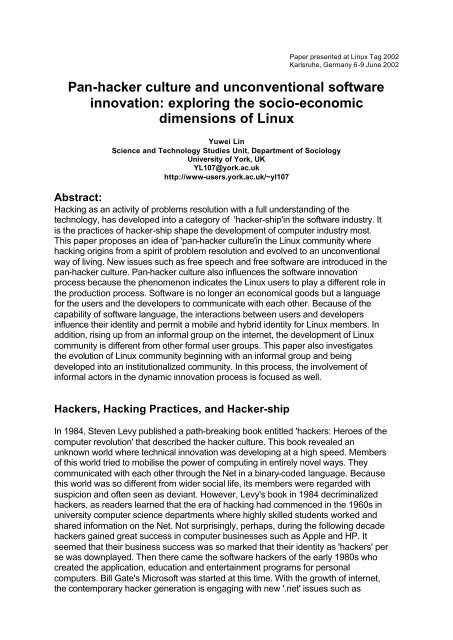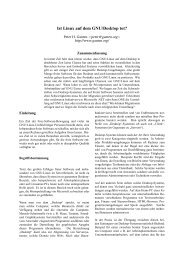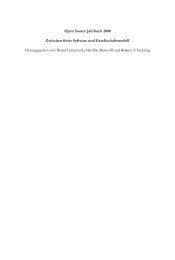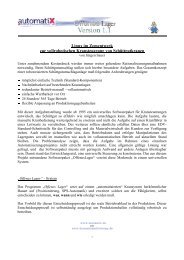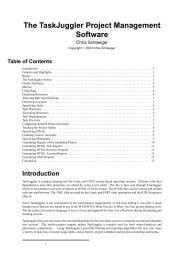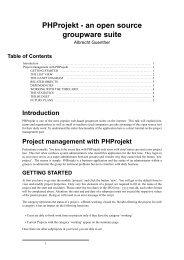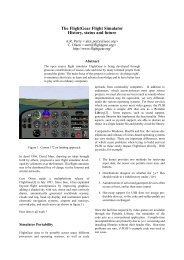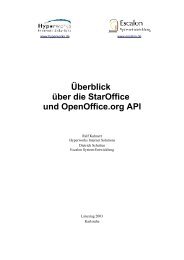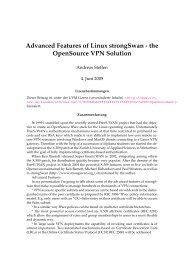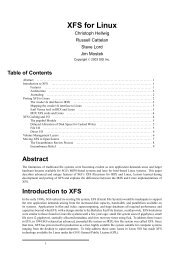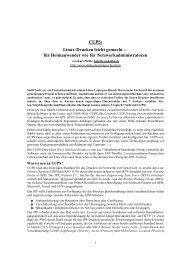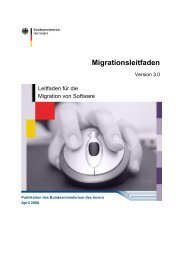Pan-hacker culture and unconventional software innovation ...
Pan-hacker culture and unconventional software innovation ...
Pan-hacker culture and unconventional software innovation ...
You also want an ePaper? Increase the reach of your titles
YUMPU automatically turns print PDFs into web optimized ePapers that Google loves.
Paper presented at Linux Tag 2002<br />
Karlsruhe, Germany 6-9 June 2002<br />
<strong>Pan</strong>-<strong>hacker</strong> <strong>culture</strong> <strong>and</strong> <strong>unconventional</strong> <strong>software</strong><br />
<strong>innovation</strong>: exploring the socio-economic<br />
dimensions of Linux<br />
Yuwei Lin<br />
Science <strong>and</strong> Technology Studies Unit, Department of Sociology<br />
University of York, UK<br />
YL107@york.ac.uk<br />
http://www-users.york.ac.uk/~yl107<br />
Abstract:<br />
Hacking as an activity of problems resolution with a full underst<strong>and</strong>ing of the<br />
technology, has developed into a category of '<strong>hacker</strong>-ship'in the <strong>software</strong> industry. It<br />
is the practices of <strong>hacker</strong>-ship shape the development of computer industry most.<br />
This paper proposes an idea of 'pan-<strong>hacker</strong> <strong>culture</strong>'in the Linux community where<br />
hacking origins from a spirit of problem resolution <strong>and</strong> evolved to an <strong>unconventional</strong><br />
way of living. New issues such as free speech <strong>and</strong> free <strong>software</strong> are introduced in the<br />
pan-<strong>hacker</strong> <strong>culture</strong>. <strong>Pan</strong>-<strong>hacker</strong> <strong>culture</strong> also influences the <strong>software</strong> <strong>innovation</strong><br />
process because the phenomenon indicates the Linux users to play a different role in<br />
the production process. Software is no longer an economical goods but a language<br />
for the users <strong>and</strong> the developers to communicate with each other. Because of the<br />
capability of <strong>software</strong> language, the interactions between users <strong>and</strong> developers<br />
influence their identity <strong>and</strong> permit a mobile <strong>and</strong> hybrid identity for Linux members. In<br />
addition, rising up from an informal group on the internet, the development of Linux<br />
community is different from other formal user groups. This paper also investigates<br />
the evolution of Linux community beginning with an informal group <strong>and</strong> being<br />
developed into an institutionalized community. In this process, the involvement of<br />
informal actors in the dynamic <strong>innovation</strong> process is focused as well.<br />
Hackers, Hacking Practices, <strong>and</strong> Hacker-ship<br />
In 1984, Steven Levy published a path-breaking book entitled '<strong>hacker</strong>s: Heroes of the<br />
computer revolution' that described the <strong>hacker</strong> <strong>culture</strong>. This book revealed an<br />
unknown world where technical <strong>innovation</strong> was developing at a high speed. Members<br />
of this world tried to mobilise the power of computing in entirely novel ways. They<br />
communicated with each other through the Net in a binary-coded language. Because<br />
this world was so different from wider social life, its members were regarded with<br />
suspicion <strong>and</strong> often seen as deviant. However, Levy's book in 1984 decriminalized<br />
<strong>hacker</strong>s, as readers learned that the era of hacking had commenced in the 1960s in<br />
university computer science departments where highly skilled students worked <strong>and</strong><br />
shared information on the Net. Not surprisingly, perhaps, during the following decade<br />
<strong>hacker</strong>s gained great success in computer businesses such as Apple <strong>and</strong> HP. It<br />
seemed that their business success was so marked that their identity as '<strong>hacker</strong>s' per<br />
se was downplayed. Then there came the <strong>software</strong> <strong>hacker</strong>s of the early 1980s who<br />
created the application, education <strong>and</strong> entertainment programs for personal<br />
computers. Bill Gate's Microsoft was started at this time. With the growth of internet,<br />
the contemporary <strong>hacker</strong> generation is engaging with new '.net' issues such as
licensing, patents, security <strong>and</strong> privacy, all key to the development of the <strong>software</strong><br />
industry. In addition to developing <strong>software</strong> technology, <strong>hacker</strong>s in this generation<br />
also have to deal with more social <strong>and</strong> political issues than before.<br />
Reviewing the history of <strong>hacker</strong>s, an evolution comparable to the history of<br />
computers can be observed. However, the definition of '<strong>hacker</strong>' remains obscure.<br />
Though there is a Hacker Dictionary <strong>and</strong> a code of <strong>hacker</strong> (Hacker Ethics), a single<br />
<strong>and</strong> stable definition of the '<strong>hacker</strong>' is hard to give. While the majority of the public still<br />
regards <strong>hacker</strong>s as hostile, for insiders1 in the <strong>hacker</strong> communities, being a <strong>hacker</strong><br />
does not mean being exactly good or bad; rather, being a <strong>hacker</strong> means being<br />
creative <strong>and</strong> innovative.<br />
In fact, rather than seek a single definition of 'the <strong>hacker</strong>' it is more appropriate to<br />
examined hacking-type practices as they are found within <strong>and</strong> outside of the<br />
conventional world of computing. Perhaps not every insider in the computer industry<br />
would call himself/herself a <strong>hacker</strong>, but we can observe <strong>hacker</strong> practices being<br />
followed there. The practices include2 :<br />
1. Interest in tackling <strong>software</strong> problems <strong>and</strong> resolving them.<br />
2. Writing challenging scripts to explore <strong>software</strong> vulnerabilities.<br />
3. A strong interest in decryption, code-breaking.<br />
4. Writing creative scripts <strong>and</strong> sharing them.<br />
5. Developing novel hardware <strong>and</strong> sharing the proprietary information on which it is<br />
based.<br />
The first point is the classical meaning of hacking in computing. The second point<br />
specifies hacking in computer security as the third point is extended hacking to the<br />
challenge in cryptography. The fourth <strong>and</strong> fifth point are more about free computing<br />
(hardware or <strong>software</strong>). The order of the list also implies the timeline evolution of<br />
hacking from technological problem resolution in student circle to a wide range of<br />
practioners including computer professionals.<br />
What is interesting is that such practices are not peculiar or specific to the activities<br />
typically ascribed to <strong>hacker</strong>s, but might be said to characterise computer <strong>innovation</strong><br />
more generally. In this way such a constellation of practices may not provide<br />
quantitative indicators to measure the degree to which <strong>hacker</strong>s influence the<br />
development of <strong>software</strong>, but they do allow us to map the pattern of activities that<br />
have played a central role in the ongoing development of innovative <strong>software</strong> (<strong>and</strong><br />
indeed operating systems), <strong>and</strong> where <strong>and</strong> when these activities are found within <strong>and</strong><br />
outside of conventional, mainstream computing. Because these practices can be<br />
readily found among the majority of insiders in the computer world, this might give us<br />
a chance to observe what I would like to call'<strong>hacker</strong>-ship'3, an activity that is much<br />
more extensive than conventionally assumed, <strong>and</strong> suggests points of contiguity <strong>and</strong><br />
overlap between mainstream <strong>and</strong> 'outsider'4 <strong>innovation</strong>. This overlap has, in fact,<br />
been increasingly seen to be important in a number of areas where new technologies<br />
are involved, notably in the case of innovative health technologies. It is this<br />
phenomenon I want to explore in this paper, <strong>and</strong> do so through the development of<br />
Linux as a system that occupies a dual site within <strong>and</strong> outside mainstream<br />
computing.<br />
The development <strong>and</strong> operation of Linux has its historical roots in hacking <strong>culture</strong>.<br />
Actually, several open source programmers such as Eric Raymond, Richard Stallman
<strong>and</strong> Linus Torvalds have declared themselves to be pioneering '<strong>hacker</strong>s' in their<br />
publications 5. Linux is a good example of hacking evolution. Linus Torvalds began<br />
Linux as a hack; he wanted to play with Minix with a new hardware platform<br />
previously unknown by Minix. So, Linus wrote his own version of Minix. It was in<br />
1991. Then, he put it free on the Internet <strong>and</strong> a lot of people put things in it, <strong>and</strong><br />
resolved some problems. Linux is the product of <strong>hacker</strong> team-work. Being a Linux<br />
user is similar to being a <strong>hacker</strong>: the user is willing to write creative programmes <strong>and</strong><br />
to share information (source code). I would like to call this phenomenon a 'pan<strong>hacker</strong>'<br />
phenomenon. Users in the Linux community have been living with the pan<strong>hacker</strong><br />
<strong>culture</strong> since the very beginning of Linux. I want to argue that this pan-<strong>hacker</strong><br />
<strong>culture</strong> has played an important role in shaping <strong>innovation</strong> in the <strong>software</strong> industry.<br />
<strong>Pan</strong>-<strong>hacker</strong> <strong>culture</strong><br />
As mentioned above, a <strong>hacker</strong> can be explained broadly or narrowly, inclusively <strong>and</strong><br />
exclusively. According to most of the insiders in the <strong>hacker</strong> communities, a <strong>hacker</strong> is<br />
the one who writes programmes using <strong>unconventional</strong> <strong>software</strong> engineering<br />
methods, improving the efficiency <strong>and</strong> speed of already-existing programs, <strong>and</strong> who<br />
regards programming as a form of fun or entertainment.<br />
Linux originates from the idea of open source <strong>and</strong> gain collective efforts from diverse<br />
<strong>hacker</strong> users. Programming for the Linux developers was a hobby 6. Linux was<br />
created on their leisure time. For these experts, they are <strong>hacker</strong>s without doubt. But I<br />
would like to argue that, Linux end-users, from the broad meaning of <strong>hacker</strong>, can be<br />
called '<strong>hacker</strong>s' as well.<br />
Being a <strong>hacker</strong>, you have to be akin at learning new knowledge <strong>and</strong> embracing new<br />
technology 7. When Linux appeared to be an <strong>unconventional</strong> operating system in the<br />
very beginning, general users tended to stick on the original system that they were<br />
familiar with, such as Microsoft. Surely this is from the very human nature to be<br />
stable. However, curiosity is another human nature. Some people prefer adventure to<br />
sweet home life. They take the first step <strong>and</strong> try Linux. To be a Linux user, one has to<br />
know the basic program knowledge because the UNIX-type system all relied very<br />
much on language comm<strong>and</strong> input rather than mouse-click input. Therefore, to meet<br />
the requirements, an outsider of the computer science must learn programming. In<br />
addition, Linux is a new system; new program <strong>and</strong> new application are renewing <strong>and</strong><br />
adding quickly. To catch on the innovative pace, one must update his/her knowledge<br />
very often. Moreover, because of the open source trait, Linux contributors get<br />
information <strong>and</strong> add information almost limitlessly. More information is generated on<br />
the Linux engineering process. Linux users must work hard enough to operate Linux<br />
adequately. Well, if one just takes Linux as a hard work on <strong>software</strong> learning, he/she<br />
would get frustrated easily <strong>and</strong> drop out of the group straightforwardly. Being a<br />
member in the Linux community must be a joy so that one can have sufficient<br />
motives keeping enthusiastic at Linux process. These are the reasons why an<br />
general Linux user is a <strong>hacker</strong>.<br />
As a whole, the Linux community is constructed as a pan-<strong>hacker</strong> <strong>culture</strong> by its<br />
developers <strong>and</strong> end-users.
The hybrid identity<br />
Generally speaking, both developers/innovators <strong>and</strong> end-users belong to the user<br />
category. However, in Linux community, the boundary between<br />
developers/innovators <strong>and</strong> users are finer than others. In fact, a Linux user can have<br />
a hybrid identity as both an end-user <strong>and</strong> a developer. In an open source community,<br />
information is distributed freely. Therefore, one can be both an information-receiver<br />
<strong>and</strong> a contributor; one can be an end-user of other people's program, <strong>and</strong> contribute<br />
to modify the program then re-distribute it again. The Linux users are 'perpetual<br />
novice' 8, <strong>and</strong> also experts/insiders. This cycle is processing through the on-line<br />
communication in newsgroups, mailing lists, chat rooms or even ICQ. The idea of<br />
open source enables the users to have a hybrid identity, <strong>and</strong> this ability to be both<br />
developers <strong>and</strong> users promises Linux to be a dynamic <strong>and</strong> creative operating<br />
system.<br />
Unconventional <strong>software</strong> <strong>innovation</strong> process<br />
The 'user' is the most crucial factor in the <strong>innovation</strong> process. Because of the users'<br />
<strong>hacker</strong> traits, the Linux is turning out to illustrate an <strong>unconventional</strong> <strong>software</strong><br />
<strong>innovation</strong>. While more Linux users gather to form a community, the diffusion of<br />
<strong>innovation</strong> has been happening. Diffusion is a communication process in which new<br />
ideas, opinions or products are adopted throughout a society. 'Diffusion is the<br />
process by which an <strong>innovation</strong> is communicated through certain channels over the<br />
members of a social system' 9. According to Rogers (ibid.), a technological<br />
<strong>innovation</strong> is adopted following with five stages: knowledge, persuasion, decision,<br />
implementation <strong>and</strong> confirmation. He also distinguishes five groups of users:<br />
innovators, early adopters, early majority, late majority <strong>and</strong> laggards. Linux has been<br />
developed by innovators <strong>and</strong> adopted by early adopters. Now there has been a<br />
majority of early users. In the process of Linux diffusion, there are several<br />
<strong>innovation</strong>al facts can be observed. Some of them are followed the traditional<br />
<strong>innovation</strong> rules, but some of them are <strong>unconventional</strong>.<br />
The process of Linux diffusion followed the procedure that from innovators, early<br />
adopters, early majority, late majority <strong>and</strong> laggards (maybe soon in the future). The<br />
early adopters had a low resistance (the <strong>hacker</strong> trait) therefore the diffusion rate on<br />
them was faster. Via the support of these early adopters, the critical mass was<br />
formed (Linux community) to facilitate the diffusion process. The fact 're-invention'<br />
also appeared in the development of Linux that kernel <strong>and</strong> peripheral programs are<br />
changed <strong>and</strong> modified by users in the process of its adoption <strong>and</strong> implementation.<br />
Linux community is constructed to fulfill the corresponding uses as 'a source of novel<br />
product concepts' made by lead users. The development of Linux community is<br />
exactly a socio-technical constructed model. To analyze the socio-political changes<br />
in Linux <strong>innovation</strong> process, views on the 'user representation' are employed since<br />
'user' is the most important factor in the Linux <strong>innovation</strong> process.<br />
Vedel 10 argued that the politics of technological <strong>innovation</strong> is based on the notion of<br />
the 'socio-politics of usages' 11. He suggested to analyze the intersection of four<br />
determinant factors while studying technology <strong>innovation</strong>. The four factors are<br />
technical <strong>and</strong> social logics, which group together into the concept of socio-technical<br />
configuration, <strong>and</strong> production <strong>and</strong> use logics, which together form the concept of user<br />
representation. Vedel mentioned that although the social dynamics of technological
<strong>innovation</strong>s develop through the process of socio-technical configuration, the politics<br />
of <strong>innovation</strong>s is forged through the process of representation. However, the<br />
antagonists of Vedel disagreed with him <strong>and</strong> asserted that users have difficulties in<br />
organizing themselves as pressure or lobbying groups because of 'aggregation of<br />
dispersed interests', which are sometimes conflicting if not contradictory. Pierre<br />
Chambat 12 actually said, in front of a highly fragmented <strong>and</strong> specialized technology,<br />
users tend to become rather 'atomized' <strong>and</strong> individualized without common identity<br />
<strong>and</strong>, hence, incapable to mobilize collective action. Vedel's antagonists considered<br />
users as lack of technical expertise, so they thought a number of experts <strong>and</strong><br />
spokespersons of users are emerging, who are often poorly representing their whole<br />
group. Consequently, Chambat remarked, one attends 'an assimilation of market to<br />
democracy, of users to consumers or clients <strong>and</strong> of liberty to choice'. Moreover, he<br />
highlights that 'the privatization of telecommunication companies, the deregulation of<br />
the sector <strong>and</strong> the marginalization of public services push towards the direction, on<br />
the one h<strong>and</strong>, of a debilitation of the institutionalized representation of users <strong>and</strong>, on<br />
the other h<strong>and</strong>, of a reinforcement of the image of the user as a consumer'.<br />
The formation of Linux community proves that Vedel's argument makes sense in the<br />
user-representation in the process of technological <strong>innovation</strong>. Because what Vedel's<br />
antagonists said 'users lack technical expertise' is not true among Linux users. As<br />
mentioned above, as a Linux user, one has to have <strong>hacker</strong>-ship, to be akin on<br />
learning, to be positively participate the <strong>innovation</strong> rather than passively accept the<br />
changes. Therefore, the Linux users definitely are characters of Linux community <strong>and</strong><br />
can be the perfect representation of Linux community.<br />
Nevertheless, Vedel's second argument in his 1994 publication is not the case of<br />
Linux community. From the view of science <strong>and</strong> technology studies (STS), not only<br />
the way users think of a technology <strong>and</strong> its potential uses is a result of a multiplicity<br />
of social, economical <strong>and</strong> cultural factors, but the technology is also shaped by users<br />
themselves as well. Vedel therefore said 'it is interesting to study how the producers<br />
of technology try hard to intervene on the representations of technology that the<br />
users form so as to attempt to direct the users of technology towards their own<br />
objectives'. Nevertheless, in the <strong>innovation</strong> of Linux, users can participate in the<br />
<strong>innovation</strong> process constantly due to the open source traits. The identity of users <strong>and</strong><br />
innovators/developers are overlapped with each other <strong>and</strong> form the hybrid identity.<br />
The hybrid identity enables users to have their own space in the <strong>innovation</strong> field <strong>and</strong><br />
broaden the meaning of a user. The boundary between innovator/developer <strong>and</strong> user<br />
(especially end-user) is getting blurred <strong>and</strong> soft. As long as one is competent, one<br />
can shift his identity from an user to an innovator. This mutual <strong>and</strong> active mechanism<br />
indicates a dynamic <strong>innovation</strong> system <strong>and</strong> provides the prosperous Linux<br />
community.<br />
From a chronic view, the diffusion of Linux is still complying with other traditional<br />
technological <strong>innovation</strong>s. Linux usage is stepping into the stage of late majority.<br />
Because of the reliability <strong>and</strong> efficiency of Linux, more end-users such as companies<br />
or governmental organizations choose to use Linux rather than other commercial<br />
<strong>software</strong>. This is not as of the effect of vendors/distributors' advertisements nor of the<br />
apparently cheaper price (or free price). The most important factor influencing the<br />
development of Linux is the collective <strong>hacker</strong>-ship (practices) <strong>and</strong> intense virtual<br />
communication among users in the Linux community. The spirit of information<br />
sharing brings Linux community more users. And the truth is while more users can
access to the original <strong>innovation</strong> materials such as kernel programs, they do have the<br />
more motives to renovate <strong>and</strong> the products will improve quickly diversely.<br />
Institutionalized Linux<br />
However, to allow a bigger market, to allow the laggards who lack of <strong>hacker</strong>-ship to<br />
adopt Linux, the system has to be designed more user-friendly (<strong>and</strong> still keep its<br />
reliability). In addition, to get more users <strong>and</strong> gain market power, the Linux<br />
community has to be institutionalized with licenses <strong>and</strong> vendors (this fact is<br />
happening). In doing so, an informal community of practices on Linux <strong>and</strong> <strong>hacker</strong>ship<br />
gradually gets integrated <strong>and</strong> institutionalized. Actually, open source <strong>software</strong><br />
market is still decentered <strong>and</strong> not like the case of Microsoft. Although there must be<br />
peripheral companies to help end-users with the maintain or update matters, the<br />
<strong>software</strong> market will not be dominated by Linux or a single company. Not only<br />
because there are different open source <strong>software</strong> <strong>and</strong> a lot of distributors, what<br />
distinguishes Linux from Microsoft is the diverse innovators who own a hybrid identity<br />
as both user <strong>and</strong> developer, <strong>and</strong> a core community epidemic with pan-<strong>hacker</strong> <strong>culture</strong>.<br />
The informal actors still play critical roles in the <strong>software</strong> <strong>innovation</strong> system <strong>and</strong><br />
shape the dynamics of <strong>software</strong> <strong>innovation</strong>. We should keep observing the<br />
development of Linux especially the effect of the institutionalized <strong>and</strong> commercialized<br />
market.<br />
Talking about <strong>hacker</strong> again…<br />
This paper is not suggesting that '<strong>hacker</strong>s = Linux users'. Actually, an 'identikit<br />
portrait' of <strong>hacker</strong> is not pragmatic because in reality there is no a firm sociological<br />
'photokit' of <strong>hacker</strong>. The identity of <strong>hacker</strong> is fluid <strong>and</strong> the boundary of <strong>hacker</strong> social<br />
world is soft <strong>and</strong> flexible based on a range of practices. 'Hacker' is a loose notion; it is<br />
only a metaphor which acquired a plurality of meaning in sociological discourse, <strong>and</strong><br />
the media's borrowing of the term has increased the problem of definition. I suggest<br />
not to review on the essential position of <strong>hacker</strong>s but a range of collective practices<br />
influencing <strong>software</strong> technology. This will provide us a view on how things come<br />
together in different social worlds. Linux users fosters powerful hacking <strong>culture</strong>, <strong>and</strong><br />
the ways of hacking practices are deployed to lead the Linux community into a more<br />
institutionalized formal organization. The pan-<strong>hacker</strong> phenomenon has made a 'cofabrication<br />
of knowledge <strong>and</strong> identities' possible. It proves that experts can learn from<br />
users in the wild. Users get involved in <strong>and</strong> contribute to the technology <strong>innovation</strong>. It<br />
is even more powerful in Linux <strong>innovation</strong> because users <strong>and</strong> experts are so close<br />
<strong>and</strong> mutual. Subsequently, no matter one is an user, an expert, or a <strong>hacker</strong>, one's<br />
contribution to the technological system does not depend on one's identity, but one's<br />
practices.<br />
Notes<br />
1. In this paper, the definition of 'insiders' is a person with a competent knowledge of<br />
programming <strong>and</strong> computing. In analogy, an outsider is a person who is unfamiliar with the<br />
knowledge.<br />
2. These practices were observed among actors in many fields such as 2600 London<br />
meeting, 2600 Leeds meeting, HAL 2001 conference.<br />
3. The term '<strong>hacker</strong>-ship' is in the light of the word 'craft-ship'.<br />
4. Here the term 'outsider' means '<strong>unconventional</strong>'<strong>and</strong> 'unorthodox'.
5. Raymond, E. http://www.tuxedo.org/~esr/<br />
Torvalds. L. <strong>and</strong> Diamond, D. 2001. Just For Fun: the story of an accidental revilutionary.<br />
London <strong>and</strong> NY: Texere.<br />
Williams, S. 2002. Free as in freedom: Richard Stallman's Crusade for free <strong>software</strong>.<br />
O'Reilly.<br />
6. Torvalds. L. & Diamond, D. 2001. Just For Fun: the story of an accidental revilutionary.<br />
London <strong>and</strong> NY: Texere.<br />
7. Raymond, E. http://www.tuxedo.org/~esr/<br />
8. Davis, D. M. 1997. 'The perpetual novice: an undervalued resource in the age of experts'.<br />
Mind, Culture, <strong>and</strong> Activity, 4(1), p.42-52. University of California.<br />
9. Rogers, E. 1995. Diffusion of <strong>innovation</strong>s. Fourth edition. New York: The Free Press.<br />
10. Vedel, T. 1994. 'Sociologie des <strong>innovation</strong>s technologiques des usagers: Introduction a<br />
une socio-plitique des usages'. In A. Vitalis (ed.), Medias et Nouvelles Technologies: Pour<br />
une Socio-Politique des Usages. P. 13-43. Rennes: Editions Apogee.<br />
11. Boudourides, M. A. 2001. 'The politics of technological <strong>innovation</strong>s: network approaches'.<br />
A paper presented at the International Summer Academy on Technological Studies, Austria,<br />
July 8-14, 2001.<br />
12. Chambat, P. 1994. NTIC et representations des usagers. In A. Vitalis (ed.), Medias et<br />
Nouvelles Technologies: Pour une Socio-Politique des Usages. p. 45-59. Rennes: Editions<br />
Apogee.<br />
References<br />
Boudourides, M. A. 2001. 'The politics of technological <strong>innovation</strong>s: network approaches'. A<br />
paper presented at the International Summer Academy on Technological Studies, Austria,<br />
July 8-14, 2001.<br />
Chambat, P. 1994. NTIC et representations des usagers. In A. Vitalis (ed.), Medias et<br />
Nouvelles Technologies: Pour une Socio-Politique des Usages. p. 45-59. Rennes: Editions<br />
Apogee.<br />
Davis, D. M. 1997. 'The perpetual novice: an undervalued resource in the age of experts'.<br />
Mind, Culture, <strong>and</strong> Activity, 4(1), p.42-52, University of California.<br />
Himanen, P. & Torvalds, L. & Manuel, C. 2001. Hacker Ethics. London: Secker & Warburg.<br />
Levy, S. 1994. Hackers: Heroes of the computer revolution. New York: Delta.<br />
Raymond, E. 2000. 'A brief history of <strong>hacker</strong>dom'.<br />
http://www.tuxedo.org/~esr/writings/<strong>hacker</strong>-history/<strong>hacker</strong>-history.html<br />
Rogers, E. 1995. Diffusion of <strong>innovation</strong>s. Fourth edition. New York: The Free Press.<br />
Rosenberg, D. K. 1999. 'How to make money with open-source <strong>software</strong>: making money on<br />
a free lunch'. http://www-4.ibm.com/<strong>software</strong>/developer/library /license.html<br />
Stallman, R. The GNU project. http://www.gnu.org/gnu/thegnuproject.html<br />
Stallman, R. 2000. Linux <strong>and</strong> the GNU project. http://www.gnu.org/gnu/linux-<strong>and</strong>-gnu.html<br />
Torvalds. L. & Diamond, D. 2001. Just For Fun: the story of an accidental revilutionary.<br />
London <strong>and</strong> NY: Texere.<br />
Vedel, T. 1994. Sociologie des <strong>innovation</strong>s technologiques des usagers: Introduction a une<br />
socio-plitique des usages. In A. Vitalis (ed.), Medias et Nouvelles Technologies: Pour une<br />
Socio-Politique des Usages. P. 13-43. Rennes: Editions Apogee.<br />
Vitalis, A.(ed.). 1994. Medias et Nouvelles Technologies: Pour une Socio-Politique des<br />
Usages. Rennes: Editions Apogee.<br />
White, M. 2001. 'Communities of practice'. Freepint 29. Nov. 2001.<br />
http://www.freepint.com/issues/291101.htm#feature.<br />
Williams, S. 2002. Free as in freedom: Richard Stallman's Crusade for free <strong>software</strong>.<br />
O'Reilly.<br />
Woolgar, S. 1991. 'Configuring the user: the case of usability trials. In J. Law (ed.), A<br />
sogiology of monsters: essays on Power, Technology <strong>and</strong> Domination. P. 58-99. London &<br />
New York: Routledge.


